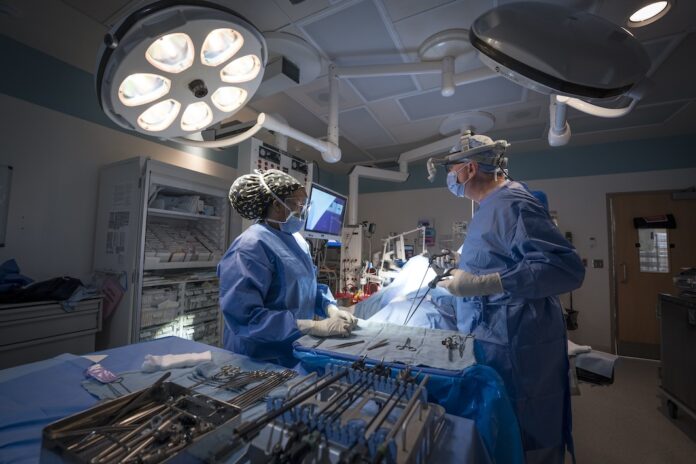A team of researchers at North York General Hospital (NYGH) is studying a video recording of a surgery. In the video, a surgical resident navigates an unusually narrow pelvic cavity as part of a reconstruction procedure. When the resident runs into difficulty, they speak up and the surgeon responds in a reassuring tone to calmly guide them with the support of the OR team.
The recording is an example of what psychological safety can look like in the OR, where a resident feels safe enough to speak up when they have trouble because they know they will receive helpful guidance instead of criticism. These types of environments can encourage open communication, learning and ultimately better patient outcomes.
“Relationship dynamics within surgical teams are just as important as technical skills when it comes to delivering quality patient care,” says Patricia Trbovich, PhD and Badeau Family Research Chair in Patient Safety and Quality Improvement at NYGH and an Associate Professor at the Institute of Health Policy, Management and Evaluation at the University of Toronto.
“However, until recently we haven’t studied the complexity of team dynamics within surgical teams and developed a way to objectively identify and assess relational concepts like
psychological safety.”
Dr. Trbovich is leading this research with NYGH surgeon Dr. Usmaan Hameed using data from Operation Room Black Boxes (ORBBs). ORBBs provide unprecedented access to understanding what occurs during surgery through a network of cameras, microphones and sensors installed in an operating room.
ORBB data can range from a patient’s vital signs to video and audio recordings of a surgical team working and laparoscopic views inside a patient. This type of information is commonly used to minimize risks and improve patient outcomes by focusing on technical performance.
In contrast, researchers working alongside Dr. Trbovich and Dr. Hameed are analyzing ORBB data to pinpoint behaviours that often go unnoticed or are taken for granted but play a key role in helping surgical teams work smoothly, especially during unexpected situations.
The team recently published some of their findings in the medical journal Annals of Surgery and found surgical team members from different professions will respond differently during periods of uncertainty, with these differences supporting successful outcomes.
“Nurses ramped-up their backup behaviour by anticipating the team needs and offering their assistance,” explains Taylor Incze, a graduate researcher on the study. “In contrast, surgeons and medical trainees amplified their psychological safety-related skills like voicing a concern and blameless
problem-solving.”
“Negative reactions to uncertainty in the OR among surgical team members can stifle communication, increase stress and lead to potentially adverse outcomes,” adds Dr. Hameed, who is also one of the study’s co-authors.
“What our research is showing is the ability to safely recover during an unexpected situation is heavily dependent on effective teamwork. By exploring these dynamics, we can move closer to ensuring that all surgical teams can perform at their best, even under the most challenging conditions.”
The research team is also using ORBB data to explore other opportunities to improve surgical safety with funding from Natural Sciences and Engineering Research Councils of Canada and the Canadian Institutes of Health Research. This includes identifying and categorizing all the contributing factors to an adverse surgical event, including workflows in the OR, the layout of equipment and tools, and even policies.
The NYGH team hopes to use their findings to support improvements in quality, safety and efficiency and to inform training programs for surgery teams. They have also approached other hospitals including Sunnybrook Health Sciences and Unity Health in Toronto, the Mayo Clinic in Minnesota and Stanford Medicine in California to analyze and code their ORBB data with a unique focus on team interactions.
“We are really on the cusp of something big in terms of how we study surgical safety and teamwork and I am thrilled that we are doing it right here at North York General,” says Dr. Trbovich.
“By systematically analyzing surgical team interactions, we can understand communication and behavioural patterns that support successful outcomes and reveal what is currently invisible.”
By Kent Anjo
Kent Anjo is a Senior Communications Specialist at North York General Hospital.


